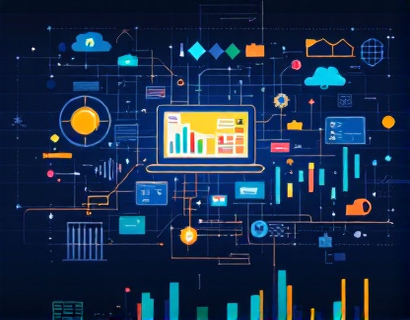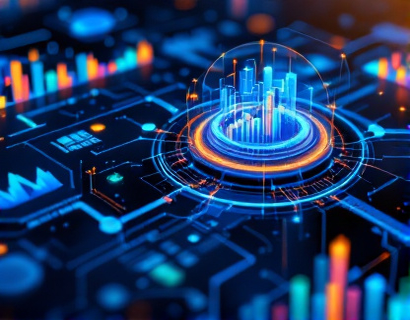Harnessing the Power of AI and Crypto: A New Era of Digital Productivity
The integration of artificial intelligence and cryptocurrency is revolutionizing the way we approach digital productivity. This synergy is not just about combining two advanced technologies but about creating a new paradigm where efficiency, task management, and innovation converge to redefine the modern workplace. For tech-savvy innovators and early adopters, the potential of AI and crypto in enhancing productivity is immense, offering tools and solutions that streamline processes, automate tasks, and unlock new levels of efficiency.
Understanding the Synergy: AI and Crypto
Artificial intelligence, with its ability to learn, adapt, and perform tasks that traditionally required human intervention, is transforming various sectors. In the context of digital productivity, AI can optimize workflows, predict user needs, and automate repetitive tasks, thereby freeing up time for more strategic and creative work. Cryptocurrency, on the other hand, introduces a decentralized and secure method of transaction, enabling new economic models and incentivization structures that can enhance motivation and reward systems in digital environments.
The combination of AI and crypto creates a powerful ecosystem where data integrity, security, and transparency are paramount. Blockchain technology, the backbone of cryptocurrency, ensures that transactions are immutable and verifiable, which is crucial for AI systems that rely on vast amounts of data. This synergy ensures that the data used to train AI models is reliable and secure, leading to more accurate and trustworthy outcomes.
Enhancing Task Management with AI
One of the most immediate impacts of AI in the workplace is in task management. AI-driven tools can analyze user behavior and preferences to suggest optimal task schedules, prioritize workloads, and even predict potential bottlenecks. For instance, AI can monitor project timelines and automatically adjust deadlines based on real-time progress and resource availability. This dynamic adjustment ensures that projects stay on track without manual intervention.
Moreover, AI can integrate with calendar applications to create personalized schedules that consider not only the user's availability but also their cognitive load. By analyzing productivity patterns, AI can recommend the best times for focused work and breaks, thereby enhancing overall efficiency. This level of personalization is a game-changer for individuals and teams looking to maximize their productivity.
Automating Repetitive Tasks
Repetitive and mundane tasks are a significant drain on productivity. AI-powered bots and virtual assistants can take over these tasks, freeing up valuable time for more meaningful work. For example, AI can automate data entry, email management, and even routine customer support interactions. These tasks, when handled by AI, not only speed up processes but also reduce the likelihood of human error.
In addition, AI can facilitate the creation of smart contracts on blockchain platforms, automating complex business processes such as invoicing, payment processing, and contract execution. These smart contracts ensure that all parties adhere to the agreed terms, reducing the need for intermediaries and speeding up transactions. This automation not only saves time but also builds trust and transparency in business dealings.
Incentivization and Motivation through Cryptocurrency
Cryptocurrency introduces a novel approach to incentivization, which can significantly boost employee motivation and engagement. By tokenizing rewards and recognition, organizations can create a more dynamic and responsive incentive system. For instance, employees can earn tokens for completing tasks, achieving milestones, or contributing to team success. These tokens can be redeemed for various rewards, such as access to premium tools, training programs, or even financial incentives.
The use of cryptocurrency in incentivization also aligns with the growing trend of decentralized work environments. Remote and freelance workers can be fairly compensated in crypto, breaking down geographical barriers and providing a more inclusive reward system. This approach not only motivates employees but also fosters a sense of community and shared goals.
Data Security and Privacy
In the realm of digital productivity, data security and privacy are paramount. AI and cryptocurrency together offer robust solutions to these concerns. Blockchain's decentralized nature ensures that data is not stored in a single point of failure, making it highly resistant to cyber attacks. Additionally, AI can enhance security by detecting and mitigating threats in real-time, using machine learning algorithms to identify unusual patterns and anomalies.
Privacy is another area where AI and crypto intersect. Cryptographic techniques, such as zero-knowledge proofs, allow AI systems to process data without accessing sensitive information. This ensures that user data remains confidential while still enabling powerful analytics and insights. The combination of AI and blockchain thus provides a secure and private environment for digital productivity tools.
Personalized Learning and Development
The integration of AI and crypto can also revolutionize professional development and learning. AI-driven platforms can analyze an individual's learning style, preferences, and career goals to curate personalized training programs. These programs can be tokenized on a blockchain, allowing learners to earn and trade credentials and badges that are verifiable and portable.
Furthermore, cryptocurrency can facilitate micro-transactions for accessing educational content, making high-quality learning resources more accessible to a broader audience. This democratization of education, combined with AI's ability to tailor learning experiences, creates a powerful tool for continuous skill development and career advancement.
Challenges and Considerations
While the potential of AI and cryptocurrency in enhancing digital productivity is vast, there are challenges and considerations that must be addressed. One of the primary concerns is the technical complexity involved in integrating these technologies. Organizations need to invest in skilled personnel and robust infrastructure to implement and maintain AI and blockchain solutions effectively.
Another challenge is the regulatory landscape. Cryptocurrency is still a relatively new and evolving field, with varying regulations across different regions. Ensuring compliance and navigating the legal framework is crucial for organizations looking to leverage crypto in their productivity tools. Similarly, AI regulations around data privacy, bias, and ethical use must be carefully considered to avoid potential pitfalls.
Future Trends and Innovations
Looking ahead, the convergence of AI and cryptocurrency is likely to bring even more innovative solutions to the forefront. One exciting area is the development of decentralized AI markets, where AI models and data can be bought, sold, and shared in a transparent and secure manner. This could lead to a more collaborative and efficient AI ecosystem, where advancements are shared and built upon collectively.
Another promising trend is the integration of AI with the Internet of Things (IoT) and cryptocurrency to create smart, autonomous systems. For example, AI can optimize the performance of IoT devices, while blockchain can ensure secure and transparent data exchange between these devices. This synergy can lead to more intelligent and efficient smart homes, cities, and industries.
Additionally, the rise of Web3, a decentralized internet powered by blockchain, will further enhance the role of AI and crypto in digital productivity. Web3 applications will leverage AI to provide personalized and secure user experiences, while cryptocurrency will enable new economic models and decentralized governance structures.
Conclusion
The integration of AI and cryptocurrency is not just a technological trend but a transformative shift in how we approach digital productivity. By harnessing the strengths of both fields, we can create more efficient, secure, and personalized digital tools that redefine the modern workplace. For tech-savvy innovators and early adopters, embracing this synergy offers a competitive edge and the opportunity to shape the future of digital productivity. As the landscape continues to evolve, staying informed and adaptable will be key to unlocking the full potential of AI and cryptocurrency.











































